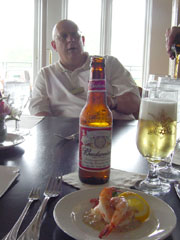|
SIGNATURE
SMOKE
When
barbecuing with beer, most people think of marinades, sauces, mops
and bastes infused with the flavors of fresh ales or lagers.
But
in an unusual twist, a Wisconsin native, Joseph "Joe" Durante,
pioneered a new way to barbecue with beer-bathed wood - using smoke
from the beechwood used in brewing Budweiser beer.
"We
call it "signature smoke," " says Durante, now the
executive vice president of the four-diamond Kingsmill Resort, a luxurious
facility that includes a conference center, premier golf courses,
tennis, spa facilities, and
more. The resort's posh Eagles Tavern at the Golf Club is the sole
site for the signature-smoked prime meats and seafood. The Kingsmill
Resort is one of the properties owned by the Anheuser-Busch Brewery,
and shares the 3,000 acres along the James River in Williamsburg,
Virginia, with the regional brewery and Busch Gardens.
Joe
Durante began his career in the culinary arts in Milwaukee at the
Pfister Hotel. "Marcus had just renovated the Pfister when I
started in the kitchens, right out of college," says Durante.
"At the time, the English Room was the most phenomenal place
to start a culinary career. Within a year, I was entering culinary
competitions with the Pfister team."
After
moving from Milwaukee, the chef worked in hospitality operations from
boutique hotels to large Marriott International properties. Durante
found new challenges when he became the executive chef for the Kingsmill
Resort in Virginia in 1995. Kingsmill's 110 cooks and chefs prepare
a wide spectrum of meals, from hand-held fare for 100,000 fans during
PGA events at the golf courses, to elegant dinners for executives
at the resort's conference center.
"The
Eagles Tavern is a gorgeous location, but we wanted to bring a new
dimension to the menu, which was mostly chophouse specialties, such
as steaks, veal, and seafood," Durante recalls.
After
touring the nearby Anheuser-Busch brewery, Durante wondered what happened
to the beechwood after its use in the brewing process (beechwood is
used in the lager fermentation tanks). For a brewing operation that
receives beechwood shipments by the truckload, sparing a few handfuls
was no problem for head brewer, Dan Driskill.
Durante
experimented with the flavor produced by cold-smoking beechwood into
prime beef, imported seafood and Provimi veal. Beechwood strips are
soaked in Budweiser for the seafood, Michelob's Amber Bock for the
beef and pork. The cold smoke process uses convection ovens from Alto
Shaam of Menomonee Falls. That way, smoke circulates throughout the
temperature-controlled chamber, and more of the flavor permates the
food, not just charred on its surface. 
Nearly
eight years later and after thorough testing and refining, Durante's
brainstorm to adapt the wood chips for cooking has produced a one-of-a-kind
signature smoke. It launched in the Kingsmill Eagles Tavern this summer
- to sizzling reviews. The local Hampton Roads magazine starred the
restaurant in a feature on golf course dining.
Though
mesquite, hickory, maple and other types of wood including beechwood
are often used for BBQ cooking, charcoal and smoking, only Durante
has access to the Bud-bathed wood. So, for home beercooks, Durante
recommends cold-smoking with milder fruitwoods, and finishing grilled
foods with beer-based marinades, mop sauces, and BBQ glazes.
"We
rub our Bud beercan chickens with barbecue spices before grilling
them," says Durante. "On Labor Day 2002, we are celebrating
the 30th anniversary of the Williamsburg brewery with a giant barbecue.
And on our two 6-ft. long rotisserie grills, we'll have Bud-injected
turkey breasts roasting and some locally made beer brats."
"It'll
be my own little piece of Milwaukee, imported to Williamsburg,"
says Durante.
BBQ
SPICE RUB from the Kingsmill Resort
1
tablespoon ground black pepper
1 tablespoon ground white pepper
1/3 cup chili pepper (choose mild Anaheim, medium Chipotle, or a blend
of your choice)
2 tablespoons ground cumin
2 tablespoons onion powder
1 tablespoon cayenne pepper
2 tablespoons sugar
2 tablespoons kosher salt
Mix
all ingredients. Use as a rub on chicken, pork or ribs. Yields 1 cup.
This article first appeared in
the August 21, 2002 edition of the Milwaukee Journal Sentinel Food
Section.
|